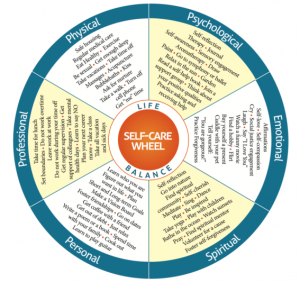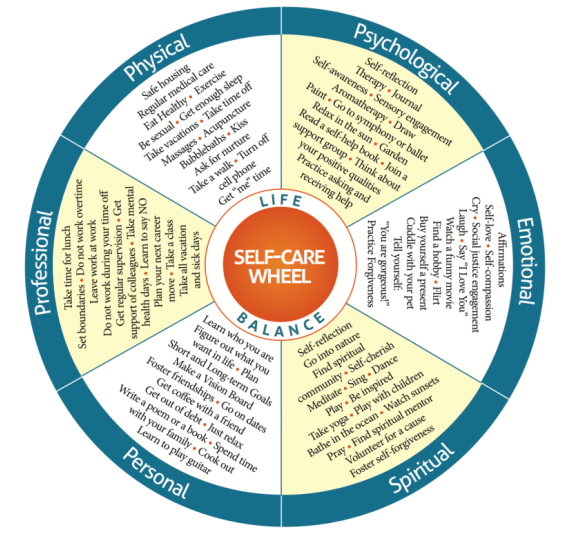 Each year on the Post-graduate diploma counselling course, my colleague Dwight and I take the trainee therapists through an exercise of reflection on self-care. Perhaps more than any other profession, self-care for therapists is a vital consideration given how ’self’ is the instrument underpinning the relationship with our clients. If the therapist is responsible for holding akin to a glass holding water, when the vessel is cracked our ability to contain is limited. Self-care is not just a kindly gesture towards ourselves, it is an ethical necessity.
Each year on the Post-graduate diploma counselling course, my colleague Dwight and I take the trainee therapists through an exercise of reflection on self-care. Perhaps more than any other profession, self-care for therapists is a vital consideration given how ’self’ is the instrument underpinning the relationship with our clients. If the therapist is responsible for holding akin to a glass holding water, when the vessel is cracked our ability to contain is limited. Self-care is not just a kindly gesture towards ourselves, it is an ethical necessity.
…and right now the pressure on this vessel and containment of process within is heightened. In the past week, going through the one year anniversary of the pandemic in the UK, a lot is being stirred up. Clients are sharing with me the monotony of what has been, the uncertainty of what is now, and concern as to the emergence back into life to come. Past, present, and future stress. Depression, exhaustion, anxiety. As always, the therapist holds the tumult of the client traversing life’s terrain; but in this COVID situation, therapists – humans too! – are negotiating this themselves. It is not unusual to get tired from my work – one of my tutors once described therapists as being ‘emotional vacuum cleaners’. Ordinarily, the vacuum cleaner bag gets emptied at the rate it fills. In my early years in practice, it took some time to find the routines and rituals that played key parts in my self-care plan: knowing the cost of the work, and knowing what best served me to counter that cost, re-energise to return to balance. Ordinarily, I can stablise, find equilibrium.
These are not ordinary times. I read something recently that has helped me reflect on finding rest during these exhausting pandemic times. Chris Heuwertz in his book “The Sacred Enneagram, talks about his own journey with self-care. I resonated with his descriptions of passion for his work and how at times he missed the warning signs that he was not doing very well at protecting a rhythm that was healthy and sustainable. I know this terrain. In the drive to do my job well and serve my clients, students, colleagues, I can go beyond a point of return. Work hard for weeks, collapse during holidays. Heuwertz draws our attention to four components of a healthy rhythm…
“Today I know that sabbath is for rest, retreats are for reflection, vacations are for recreation, and sabbatical is for renewal”.
I shared this with our trainees, adding how easy it is to conflate the four. I think back to when I have confused the intention of time away from work – trying to up my meditation practice while on holiday, or using sabbatical time (on writing projects) for emotional and physical recovery. Only in this past year have I perfected the art of sabbath: taking one complete day off a week (and most essentially, stepping back from screen time). And yet the other three remain a work in progress – in part because pandemic and ‘stay at home’ orders mean it is harder to separate out and devote blocks of time for retreat (it would have to be at home), vacation (again, at home), and sabbatical (again, where can we go?). A change in environment is a powerful reminder and support for ensuring we stay ‘on task’.
I have a break coming up – two weeks away from teaching commitments, one week away from client work. I know this is probably not long enough to take me back to pre-pandemic capacity; but I am not sure that would be a realistic outcome no matter how long I took off work now given the pandemic remains with us. With the Four Rs (rest, reflection, recreation, renewal) in mind though, I feel clearer as to how I can optimise my time and truly surrender into my tiredness. For me, this surrender includes a withdrawal, a turning inward. Yet as I have shared with friends and peers recently, there is a challenge when the pull to withdraw feels counter to the invite Spring holds. Nature around me is opening up. Maybe there is a parallel here – the pandemic induced exhaustion counter to the easing of the lockdown. Closing, opening.
How long will it take us to recover…personally, communally, globally? I know for myself it is a process that can’t be rushed. Even though I hold this in my awareness, and know I need to find more rest, I can feel the pull to get busy. An old pattern of “I will rest when its done”.
One thing I appreciate about teaching, it reinforces to “practice what you preach”!

